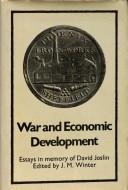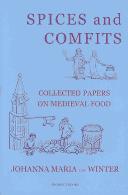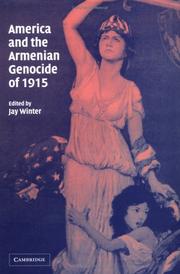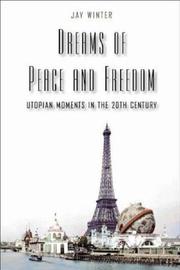| Listing 1 - 10 of 90 | << page >> |
Sort by
|

ISBN: 0521205352 9780521205351 Year: 1975 Publisher: Cambridge
Abstract | Keywords | Export | Availability | Bookmark
 Loading...
Loading...Choose an application
- Reference Manager
- EndNote
- RefWorks (Direct export to RefWorks)
Economic order --- 330.35 --- #BUAR:bibl.de Bock --- Economische groei. Kwantitatieve toename. Technische vooruitgang --zie ook {338.09} --- Festschrift - Libri Amicorum --- Guerre --- développement économique --- Krieg --- Wirtschaftsentwicklung --- Aspect économique --- Discours, essais, conférences. --- guerre --- Aspect économique. --- 330.35 Economische groei. Kwantitatieve toename. Technische vooruitgang --zie ook {338.09} --- Krieg. --- Wirtschaftsentwicklung.
Book
ISBN: 9022842916 9789022842911 Year: 1976 Publisher: Haarlem : Fibula-Van Dishoeck,
Abstract | Keywords | Export | Availability | Bookmark
 Loading...
Loading...Choose an application
- Reference Manager
- EndNote
- RefWorks (Direct export to RefWorks)
641.5 --- 094:641.5 --- Preparation of foodstuffs and meals. Cookery --- Oude en merkwaardige drukken. Kostbare en zeldzame boeken. Preciosa en rariora-:-Preparation of foodstuffs and meals. Cookery --- 094:641.5 Oude en merkwaardige drukken. Kostbare en zeldzame boeken. Preciosa en rariora-:-Preparation of foodstuffs and meals. Cookery --- 641.5 Preparation of foodstuffs and meals. Cookery --- Housekeeping --- Antiquity --- cookbooks --- anno 500-1499 --- Cooking --- Food in art
Book
ISBN: 9789087046705 9087046707 Year: 2017 Publisher: Hilversum Verloren
Abstract | Keywords | Export | Availability | Bookmark
 Loading...
Loading...Choose an application
- Reference Manager
- EndNote
- RefWorks (Direct export to RefWorks)
Al meer dan vijftig jaar houdt prof. em. jkvr. dr. Johanna Maria van Winter zich bezig met middeleeuwse studies. Zij studeerde geschiedenis in Groningen en Gent (1945-1953), met middeleeuwse geschiedenis als hoofdvak. In 1962 promoveerde ze op Ministerialiteit en ridderschap in Gelre en Zutphen. Hoewel ze het onderwerp niet zelf had gekozen, lag het haar zo goed dat ministerialiteit, ridderschap en adel in West-Europa een rode draad in haar onderzoek zijn gebleven. Daar kwamen twee belangrijke onderzoeksvelden bij: de geschiedenis van voedsel en gezondheid en de geschiedenis van stad en provincie Utrecht, in het bijzonder de Romeinse en middeleeuwse loop van Rijn en Vecht. Tot op de dag van vandaag doet zij onderzoek op deze terreinen. Deze bundel ter ere van haar negentigste verjaardag bevat de oogst van de afgelopen tien jaar: 29 artikelen, afkomstig uit (buitenlandse) bundels en tijdschriften, in of vertaald naar het Nederlands.
History of the Low Countries --- History of civilization --- anno 500-1499 --- Gelderland (Prov.) --- Friesland --- Friesland (Prov.) --- Utrecht --- Cooking --- Dwellings --- Cities and towns, Medieval --- Nobility --- History --- Social conditions --- Benelux countries --- Social life and customs --- 930.85.42 --- 930.85.42 Cultuurgeschiedenis: Middeleeuwen --- Cultuurgeschiedenis: Middeleeuwen --- Geschiedenis --- Middeleeuwen --- Sociaal-economische geschiedenis --- Sociaal leven --- Voeding --- Wonen --- History of civilization. --- History of the Low Countries. --- anno 500-1499. --- Friesland (Prov.). --- Friesland. --- Gelderland (Prov.). --- Utrecht. --- Geneeskunde --- Techniek (wetenschap) --- Atlas --- Museum --- Drank --- Gezondheid --- Friesland [province] --- Gelderland [province]

ISBN: 9781903018453 1903018455 Year: 2007 Publisher: Totnes : Prospect,
Abstract | Keywords | Export | Availability | Bookmark
 Loading...
Loading...Choose an application
- Reference Manager
- EndNote
- RefWorks (Direct export to RefWorks)
Food habits --- Habitudes alimentaires --- History --- Histoire --- Spices --- Spice trade --- History of civilization --- Nutritionary hygiene. Diet --- Housekeeping --- anno 500-1499 --- Social aspects
Book
ISBN: 0333265823 0333265831 Year: 1987 Publisher: Basingstoke Macmillan
Abstract | Keywords | Export | Availability | Bookmark
 Loading...
Loading...Choose an application
- Reference Manager
- EndNote
- RefWorks (Direct export to RefWorks)
World War, 1914-1918 --- Première guerre mondiale --- Social aspects --- Aspect social --- Great Britain --- Grande-Bretagne --- Social conditions --- Conditions sociales

ISBN: 1107147875 1280437685 0511165315 0511165757 0511163827 0511312733 0511497601 0511164629 9780511165757 9780511164620 9780511165313 9780511497605 9786610437689 6610437688 9780521829588 0521829585 9780511163821 9780511312731 9781107147874 9781280437687 9780521071239 0521071232 Year: 2003 Publisher: New York : Cambridge University Press,
Abstract | Keywords | Export | Availability | Bookmark
 Loading...
Loading...Choose an application
- Reference Manager
- EndNote
- RefWorks (Direct export to RefWorks)
Before Rwanda and Bosnia, and before the Holocaust, the first genocide of the twentieth century happened in Turkish Armenia in 1915, when approximately one million people were killed. This volume is an account of the American response to this atrocity. The first part sets up the framework for understanding the genocide: Sir Martin Gilbert, Vahakn Dadrian and Jay Winter provide an analytical setting for nine scholarly essays examining how Americans learned of this catastrophe and how they tried to help its victims. Knowledge and compassion, though, were not enough to stop the killings. A terrible precedent was born in 1915, one which has come to haunt the United States and other Western countries throughout the twentieth century and beyond. To read the essays in this volume is chastening: the dilemmas Americans faced when confronting evil on an unprecedented scale are not very different from the dilemmas we face today.
Armenian Genocide, 1915-1923 --- Genocide --- Armenians --- World War, 1914-1918. --- European War, 1914-1918 --- First World War, 1914-1918 --- Great War, 1914-1918 --- World War 1, 1914-1918 --- World War I, 1914-1918 --- World War One, 1914-1918 --- WW I (World War, 1914-1918) --- WWI (World War, 1914-1918) --- History, Modern --- Cleansing, Ethnic --- Ethnic cleansing --- Ethnic purification --- Ethnocide --- Purification, Ethnic --- Crime --- Armenian massacres, 1915-1923 --- Armenian question --- World War, 1914-1918 --- Foreign public opinion, American. --- History. --- Atrocities --- Foreign public opinion, American --- History --- Public opinion --- Public opinion. --- History of Eastern Europe --- History of North America --- anno 1910-1919 --- Armenia --- Arts and Humanities

ISBN: 1281740942 9786611740948 0300127510 9780300127515 0300106653 9780300106657 9780300126020 0300126026 9781281740946 6611740945 Year: 2006 Publisher: New Haven : Yale University Press,
Abstract | Keywords | Export | Availability | Bookmark
 Loading...
Loading...Choose an application
- Reference Manager
- EndNote
- RefWorks (Direct export to RefWorks)
In the wake of the monstrous projects of Hitler, Stalin, Mao, and others in the twentieth century, the idea of utopia has been discredited. Yet, historian Jay Winter suggests, alongside the "major utopians" who murdered millions in their attempts to transform the world were disparate groups of people trying in their own separate ways to imagine a radically better world. This original book focuses on some of the twentieth-century's "minor utopias" whose stories, overshadowed by the horrors of the Holocaust and the Gulag, suggest that the future need not be as catastrophic as the past.The book is organized around six key moments when utopian ideas and projects flourished in Europe: 1900 (the Paris World's Fair), 1919 (the Paris Peace Conference), 1937 (the Paris exhibition celebrating science and light), 1948 (the Universal Declaration of Human Rights), 1968 (moral indictments and student revolt), and 1992 (the emergence of visions of global citizenship). Winter considers the dreamers and the nature of their dreams as well as their connections to one another and to the history of utopian thought. By restoring minor utopias to their rightful place in the recent past, Winter fills an important gap in the history of social thought and action in the twentieth century.
Utopias --- Utopian socialism --- Socialism, Utopian --- Socialism --- History
Book
ISBN: 9780521873239 0521873231 9781139033978 1108466613 1108294677 1108294375 1108292879 1108295282 1108294987 1108296483 1139033972 1108296181 9781108296182 9781108296489 Year: 2017 Publisher: Cambridge : Cambridge University Press,
Abstract | Keywords | Export | Availability | Bookmark
 Loading...
Loading...Choose an application
- Reference Manager
- EndNote
- RefWorks (Direct export to RefWorks)
What we know of war is always mediated knowledge and feeling. We need lenses to filter out some of its blinding, terrifying light. These lenses are not fixed; they change over time, and Jay Winter's panoramic history of war and memory offers an unprecedented study of transformations in our imaginings of war, from 1914 to the present. He reveals the ways in which different creative arts have framed our meditations on war, from painting and sculpture to photography, film and poetry, and ultimately to silence, as a language of memory in its own right. He shows how these highly mediated images of war, in turn, circulate through language to constitute our 'cultural memory' of war. This is a major contribution to our understanding of the diverse ways in which men and women have wrestled with the intractable task of conveying what twentieth-century wars meant to them and mean to us.
War and society --- Collective memory --- Collective remembrance --- Common memory --- Cultural memory --- Emblematic memory --- Historical memory --- National memory --- Public memory --- Social memory --- Memory --- Social psychology --- Group identity --- National characteristics --- Society and war --- War --- Sociology --- Civilians in war --- Sociology, Military --- History --- Social aspects --- World War, 1914-1918. --- European War, 1914-1918 --- First World War, 1914-1918 --- Great War, 1914-1918 --- World War 1, 1914-1918 --- World War I, 1914-1918 --- World War One, 1914-1918 --- WW I (World War, 1914-1918) --- WWI (World War, 1914-1918) --- History, Modern --- Social aspects. --- War in art.
Book
ISBN: 1139949802 1139950835 1139958291 1139957236 1139960407 1139961462 1139959344 1107589088 110766165X Year: 2014 Publisher: Cambridge : Cambridge University Press,
Abstract | Keywords | Export | Availability | Bookmark
 Loading...
Loading...Choose an application
- Reference Manager
- EndNote
- RefWorks (Direct export to RefWorks)
Jay Winter's powerful study of the 'collective remembrance' of the Great War offers a major reassessment of one of the critical episodes in the cultural history of the twentieth century. Dr Winter looks anew at the culture of commemoration and the ways in which communities endeavoured to find collective solace after 1918. Taking issue with the prevailing 'modernist' interpretation of the European reaction to the appalling events of 1914-18, Dr Winter instead argues that what characterised that reaction was, rather, the attempt to interpret the Great War within traditional frames of reference. Tensions arose inevitably. Sites of Memory, Sites of Mourning is a profound and moving book of seminal importance for the attempt to understand the course of European history during the first half of the twentieth century.
World War, 1914-1918. --- Memory. --- Retention (Psychology) --- Intellect --- Psychology --- Thought and thinking --- Comprehension --- Executive functions (Neuropsychology) --- Mnemonics --- Perseveration (Psychology) --- Reproduction (Psychology) --- European War, 1914-1918 --- First World War, 1914-1918 --- Great War, 1914-1918 --- World War 1, 1914-1918 --- World War I, 1914-1918 --- World War One, 1914-1918 --- WW I (World War, 1914-1918) --- WWI (World War, 1914-1918) --- History, Modern --- Europe --- Civilization --- Intellectual life
Book
ISBN: 9781009110303 9781009114271 1009114271 Year: 2022 Publisher: Cambridge ; New York, NY Cambridge University Press
Abstract | Keywords | Export | Availability | Bookmark
 Loading...
Loading...Choose an application
- Reference Manager
- EndNote
- RefWorks (Direct export to RefWorks)
This Element is a user's guide to the cultural history of warfare since 1914. It provides summaries of the basic questions historians have posed in what is now a truly global field of research. It is divided into three parts. The first provides an introduction to the cultural history of the state, focusing on the institutions of violence, both political and military, as well as introducing the key concept of the civilianization of war. The second part addresses civil society at war. It asks the question as to how do men and women try to make sense and attach meaning to the violence and cruelty of war. It also explores commemoration, religious life, humanitarianism, painting, cinema and the visual arts, and war literature and testimony. The third part explores the family, gender and migration in wartime, and shows how modern war continues to transform the world in which we live today.
War and society --- War and civilization --- History --- Civilization and war --- Civilization --- Society and war --- War --- Sociology --- Civilians in war --- Sociology, Military --- Social aspects --- 355 <09> --- 930.85.60 --- 930.85.60 Cultuurgeschiedenis: 20ste eeuw --- Cultuurgeschiedenis: 20ste eeuw --- 355 <09> Militaire geschiedenis --- Militaire geschiedenis
| Listing 1 - 10 of 90 | << page >> |
Sort by
|

 Search
Search Feedback
Feedback About UniCat
About UniCat  Help
Help News
News